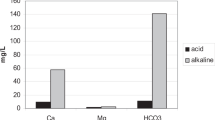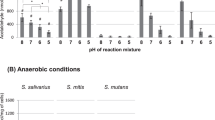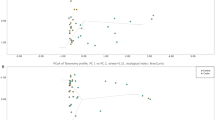Abstract
IN a previous communication1, the formation of a high degree of acidity (pH 1·7–1·8) during fermentation by ordinary bakers yeast was described. Acid formed to this extent in the suspending fluid (0·6 part to 1·0 of yeast) when unbuffered and containing potassium chloride of about 0·1 M strength or more.
This is a preview of subscription content, access via your institution
Access options
Subscribe to this journal
Receive 51 print issues and online access
$199.00 per year
only $3.90 per issue
Buy this article
- Purchase on Springer Link
- Instant access to full article PDF
Prices may be subject to local taxes which are calculated during checkout
Similar content being viewed by others
References
Conway, E. J., and O'Malley, E., Nature, 153, 555 (1944).
Walls, D. P., thesis to the National University, Ireland (1944).
Bull, H. B., and Gray, J. S., Gastroenterology, 4, 175 (1945).
Conway, E. J., and Cooke, R., J. PhysioL, 100, 1 (1941).
Conway, E. J., and MacDonnell, E., unpublished observations (1944).
Author information
Authors and Affiliations
Rights and permissions
About this article
Cite this article
CONWAY, E., FITZGERALD, O. & WALLS, D. A Theory of the Formation of Hydrochloric Acid in the Gastric Mucosa. Nature 156, 477–478 (1945). https://doi.org/10.1038/156477a0
Issue Date:
DOI: https://doi.org/10.1038/156477a0
This article is cited by
-
The metabolism of the acid-secreting stomach
The American Journal of Digestive Diseases (1959)
-
Studies on the physiological chemistry and clinical significance of urease and urea with special reference to the stomach
The Irish Journal of Medical Science (1950)
-
A redox theory of hydrochloric acid production by the gastric mucosa
The Irish Journal of Medical Science (1949)
-
Source of the Hydrogen Ions in Gastric Juice
Nature (1948)
-
Source of the Hydrogen Ions Produced by Gastric Mucosa
Nature (1947)
Comments
By submitting a comment you agree to abide by our Terms and Community Guidelines. If you find something abusive or that does not comply with our terms or guidelines please flag it as inappropriate.



